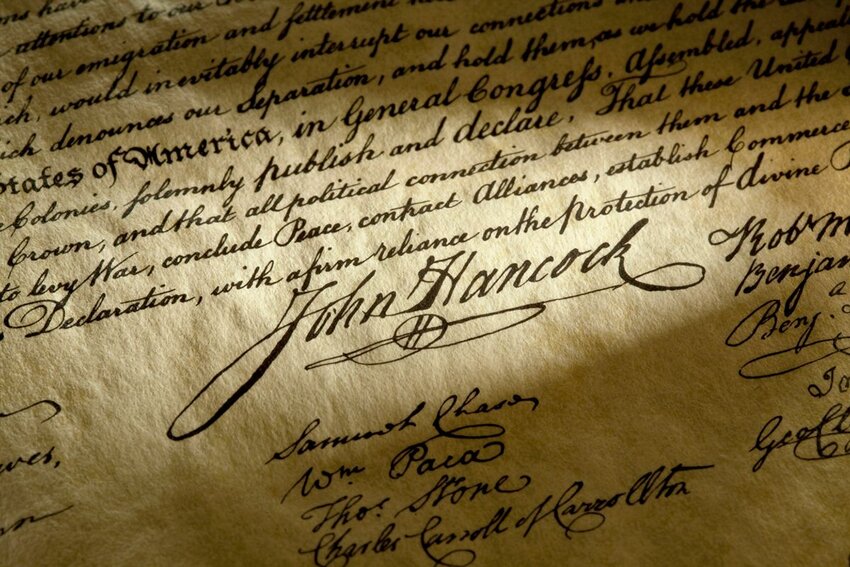Sure, some people have buildings or bridges named after them, but what about actual words? This ultimate honor is known as an "eponym" — a noun named after a person. You might be familiar with eponyms when referring to a restaurant named after a famous chef, or a gymnastics move named after the athlete who first performed it. Here are nine commonly used eponyms and the famous folks behind the words.
John Hancock
Shorthand for signature, John Hancock earned his place in history for his elaborate flourish on the Declaration of Independence. The story goes, his XXL-sized scrawl was intended so King George III could read it loud and clear. In truth, Hancock was the president of the Continental Congress at the time the Declaration of Independence was signed, so his signature was the only official name attached to it during the printing process. Now, you can add your own "John Hancock" to any legal document to make sure it's nice and legible.
Saxophone
This sweet jazz instrument was created, patented, and then exhibited by one Adolphe Sax, a Belgian instrument maker, back in the mid-1800s. The "-phone" suffix comes from the Greek word for sound, although you now know, calling it a plain old "sax" is equally correct.
Sideburns
Sideburns may owe their fame to the likes of Elvis, who rocked the facial hair feature in his day, but they owe their name to Ambrose Burnside. Burnside was a Union Army general, railroad executive, and the first president of the NRA. Google his photo and you’ll see why this distinctive look was named after him.
Cardigan
A far cry from the country club sweater set (and Taylor Swift) associations of today, "cardigan" is actually named for the seventh Earl of Cardigan, whose troops wore this cozy fashion staple into battle.
Atlas
Many eponyms actually come from mythological characters, such as "Aphrodite" and "aphrodisiac." "Atlas" is another example – the mythological Greek figure Atlas is known for holding the world on his shoulders, and today, we call a book of maps an atlas after him.
Boycott
The first boycott was an act of rebellion against Charles Boycott. This Irish land baron saw his field workers strike as part of a broader political statement to let laboring farmers own the land they worked. This led to other townspeople refusing service to Boycott and his family. The entire affair, which was covered extensively in the British press, eventually led to the coining of the word "boycott" around 1880.
Nicotine
Many product and brand names come from their founders, from Cadbury to Cadillac. But nicotine, as an ingredient, comes from a French ambassador named Jean Nicot. He scouted tobacco while visiting Portugal and brought seeds and leaves back with him. Seems the French reputation for smoking has old roots.
MacGyver
Pop culture also has an impact on language. We can thank an infamous Happy Days episode for giving us the saying “jumped the shark” to describe a TV show that’s run out of ideas. MacGyver was originally an ’80s TV show about a notoriously crafty fixer/government agent/investigator (played by Richard Dean Anderson). To "MacGyver" something is shorthand for cobbling together something ingenious out of impossibly limited resources.
Fahrenheit
You’ll see a ton of eponyms in the fields of science, medicine, and math. Inventors, or those to first discover something, get the honor of coining the phenomenon in their name. "Fahrenheit" is one such example, as the temperature measuring system was invented by German physicist Gabriel Fahrenheit. A few other science and medical terms named after people? "Fallopian tube" comes from Italian physician Gabriele Falloppio, "Parkinson’s disease" is named after British historian James Parkinson, and "pasteurization" is thanks to French chemist Louis Pasteur.
Photo Credit: smartstock/ iStock

